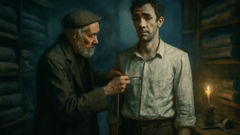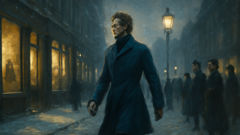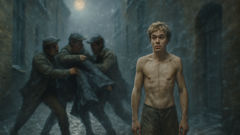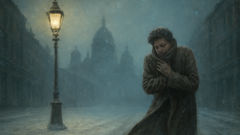Introduction
Saint Petersburg in the mid-1800s lay beneath a slate-colored sky that seemed pressed too close to its rooftops. The city’s great stone avenues were forever shrouded in a chill fog, and at dusk the streets dissolved into a half-world of shivering silhouettes, each hurrying home beneath the weight of another Russian winter. Amid the jumble of government offices—those endless warrens of yellowed paper and echoing boots—there existed a soul so ordinary, his footsteps barely left a mark on the city’s frozen heart. Akim Petrovich was a copyist, a humble transcriber of imperial edicts whose existence was as precise and unchanging as the script he inked each day. To his colleagues, Akim was a specter, a thin-shouldered man who seemed stitched together by habit and duty, with eyes as pale as river ice and fingers red from the cold. His life was measured in the slow accumulation of years, each much like the last: a narrow bed in a communal flat, bread bought with kopecks counted twice, and the familiar ache of drafty air gnawing through his one threadbare overcoat. But even the most invisible life can tremble with hope, and sometimes all it takes is a single longing—a need, simple yet enormous—to awaken the world’s indifference to the ache of an individual heart. Akim’s longing began, as such things do, with the cold. One November evening, as he trudged home past the flickering lamplights and hunched carriages, the icy wind pierced his battered coat, biting bone-deep. He dreamt, for the first time in years, of warmth: of a garment that would shield him from the city’s cruelty, a coat not patched and faded, but new. This hope, strange and audacious, grew inside him until it blazed brighter than any lamp along Nevsky Prospekt. The story of Akim and his overcoat would become one of longing’s quiet miracles—and its devastating price.
The Gray Routine: Shadows and Yearning
Akim Petrovich’s life was defined by monotony. His world was not one of grand passions or high drama, but of small, daily rituals enacted in the hushed gloom of a government records office. Every morning, he rose before the sun. He washed his face in icy water from a cracked porcelain bowl and dressed in the same faded suit he’d worn for years. The ritual of preparing his tea—weak, barely colored—was a comfort, as were the routines that followed: the scraping of boots on the communal landing, the creak of the iron gate, the silent trudge through courtyards wreathed in mist.

At the office, Akim’s desk sat beside a drafty window. The panes were frosted over, so the light within was a dull gray—never quite morning, never quite night. His superiors barely noticed him, save when a mistake in copying brought a rare, scolding glance. His colleagues were louder souls, their laughter bouncing from one desk to another, but to Akim they seemed distant as stars. When he did speak, it was with careful, precise words, and always about the documents in front of him. He had no family in the city. A cousin in the provinces sent an occasional postcard, but Akim’s world was mostly self-contained: a flat, an office, a street, all connected by the same unvarying path.
The overcoat—his overcoat—was his most precious belonging and also his greatest shame. Once, it had been navy blue, but years of wear had faded it to an uncertain gray. The lining was torn, the collar threadbare, and the buttons long mismatched. Patches—some stitched by Akim’s own clumsy hand—dotted the sleeves and hem. On especially cold days, he pressed his arms to his sides and hunched his shoulders, but the wind still found its way in, gnawing through to his bones. He endured it as he endured most things: quietly, stoically. The city’s cold was just another fact of life.
But that November, the cold seemed sharper, more relentless than ever before. The city’s canal froze over early, and snow drifted against the doorways. One evening, as Akim climbed the stairs to his flat, he paused by his neighbor’s window. Inside, a family gathered around a bright samovar; laughter spilled out onto the landing. For a moment, Akim pressed his palm to the frosted glass, not for warmth, but for something harder to name—a longing not just for heat, but for presence, for belonging.
That night, Akim sat on his narrow bed and examined his coat by lamplight. He could no longer deny the truth: it was beyond mending. Even the tailor on Bolshaya Morskaya—who had once been able to work miracles with thread—shook his head when Akim approached him the next morning. “It’s not a coat anymore, Petrovich. It’s a memory.” The words stung. On the walk home, Akim tried to calculate the cost of a new overcoat. His savings were meager; each ruble represented weeks of scraping by, forgoing bread, skipping a meal. But the cold was not something he could reason with.
That night, he took out his tin box of coins and began counting. The task became a ritual: each evening, after a day spent hunched over documents, Akim tallied his savings. He stopped visiting the bakery. He watered down his tea. He stretched every kopeck until it seemed they might snap. The dream of a new coat took root in his mind. He imagined how it would feel: heavy wool draped over his shoulders, warmth cocooning him as he walked along the river. Perhaps, he thought, people would look at him differently. Perhaps they might even smile.
The weeks passed in quiet sacrifice. Akim grew thinner, his cheeks hollow. But inside, something burned—a hope that lent a strange clarity to his days. When at last he had enough for a new overcoat, he visited the tailor again. This time, the old man measured him with gentle hands and nodded. “A fine coat, Petrovich. You’ll see.”
Each evening, Akim stopped by the shop to watch the tailor work. He chose a deep blue wool, rich and soft. He selected sturdy brass buttons and a velvet collar. The anticipation was a balm; for the first time in years, he felt visible. When at last the overcoat was ready, the tailor presented it to him with a flourish. Akim tried it on, and the world shifted. He stood taller, his shoulders squared. In the mirror, he saw not a ghost, but a man.
The next morning, Akim walked to work through a city transformed. Snow glistened on the rooftops, and passersby glanced at his new coat with open admiration. He felt a warmth deeper than wool—a sense that he belonged among the living. For one shining day, his life was touched by possibility.
A Brief Bloom: The World in New Colors
The transformation was subtle, almost invisible to those around him, but to Akim Petrovich it felt as if he’d stepped into another life. The new overcoat—heavy, deep blue, lined with soft velvet—hugged his shoulders with reassuring weight. As he walked through the city, boots crunching over fresh snow, he became aware of the eyes of strangers. A shopkeeper nodded at him as he passed; a group of students on the corner paused their laughter to admire the coat’s gleaming brass buttons. The city itself seemed less indifferent; its harsh edges softened, if only slightly.

At the office, his arrival stirred a rare ripple of conversation. “Is that Petrovich? Look at him!” whispered one clerk to another. For the first time in years, Akim felt seen—not as a curiosity or a target for jokes, but as a man worthy of notice. Even the deputy director, who usually sailed past the junior clerks without a glance, paused beside Akim’s desk. “A fine coat, Petrovich,” he said, his tone edged with surprise. Akim flushed with pride, murmured his thanks, and returned to his papers with trembling hands. The coat made even the drudgery of copying edicts seem lighter; its warmth was a shield against the office’s persistent drafts and the biting cold that waited outside.
But the real change was within. The new coat gave Akim a sense of dignity—a sense that perhaps, after all these years, he might take up a rightful place among his fellow citizens. He found himself walking more slowly along Nevsky Prospekt after work, lingering by shop windows he’d once hurried past. He noticed details: the way the lamplight played along the canal’s icy surface, the colors of scarves and bonnets in the crowd, the laughter spilling from tavern doors. It was as if a film had been peeled away from his eyes.
One evening, as snow drifted softly beneath the lamps, Akim allowed himself a small extravagance: he stepped into a café and ordered tea. The warmth and chatter inside enveloped him. He settled into a corner with his cup, watching the steam rise in curling patterns. For a moment, he was not invisible. A young woman at a nearby table glanced at him—at his coat, perhaps—and smiled shyly. He smiled back, feeling a giddy awkwardness flutter in his chest. It was a fleeting moment, but it stayed with him all the way home.
His colleagues, emboldened by his new appearance, began to include him in their conversations. They asked about the tailor, admired the cut of the coat, even invited him to join them at lunch. Akim was hesitant at first, unsure how to join in, but slowly he allowed himself to accept their gestures. He spoke little, but listened intently. The world no longer seemed so distant.
At home, he treated the coat with reverence. Each night he brushed away the city’s grime and hung it carefully from a peg above his bed. He ran his fingers along the velvet collar, marveling at its softness. The coat became a symbol of everything he’d denied himself—a sign that he could claim, however briefly, a measure of comfort and pride.
But beneath this happiness lay an uneasy knowledge: it could not last. The city’s winter grew harsher, and Akim became fiercely protective of his new possession. He avoided crowds, skirted alleyways where drunken revelers gathered. Each time he walked home after sunset, he glanced over his shoulder, wary of the shadows. Yet the joy he felt in those brief days could not be erased by fear.
Then came the invitation. The deputy director was to celebrate his promotion with a gathering at his home, and all clerks were expected to attend. For Akim, it was both an honor and a terror. He spent hours preparing, brushing his coat until it gleamed, rehearsing polite phrases in his mind. On the appointed night, he set out through the city’s labyrinthine streets, heart pounding with anticipation. Snow fell thickly, muffling the world to a hush. The lamps cast pools of gold on the drifts, and Akim moved as if in a dream—a figure newly made, wrapped in hope and velvet blue.
Nightfall and Loss: The Vanishing Hope
The city was a labyrinth that night—alleys choked with snowdrifts, streets eerily quiet beneath the muffled hush of falling flakes. Akim Petrovich moved cautiously, his new overcoat buttoned up tight, heart swelling with pride and apprehension. He carried with him a sense of occasion, a feeling that tonight he might finally step out of the shadows that had always defined him.

The deputy director’s house stood at the edge of a broad square, its windows glowing invitingly. Laughter spilled into the night as guests arrived in clusters, their boots crunching through icy ruts. Akim hesitated on the threshold, brushed imaginary lint from his collar, and entered. The rooms were bright and warm, crowded with clerks in their best attire. For once, Akim felt himself an equal; colleagues greeted him with nods and smiles. He drank sweet tea, nibbled pastries, and listened to stories of promotions and travels. There was a moment—brief but searing—when he caught sight of his reflection in a gilded mirror. The blue overcoat set him apart: he looked dignified, almost distinguished.
As the evening waned, Akim excused himself and stepped out into the night. The city had grown colder; wind howled through the squares, carrying with it a sense of unease. He wrapped himself tighter and hurried along deserted streets, taking a shortcut through a narrow alley lined with shuttered shops.
There, beneath the dim glow of a lamp, three shadows detached themselves from the darkness. Akim’s pulse hammered in his ears as the men surrounded him. Their voices were slurred, their eyes bright with malice and drink. They saw the coat—its velvet collar, gleaming buttons—and their envy flashed like knives. Akim tried to plead, but the men only laughed. In a swift, brutal moment, they wrenched the overcoat from his shoulders and vanished into the snowy gloom.
Stunned, Akim stood shivering in his thin shirt. The cold cut deeper than ever before. The world spun around him—lamplight warped by tears and terror. He stumbled through the streets, desperate for help, but the doors he knocked on remained closed. When at last he reached the police station, his words spilled out in fragments: "My coat—stolen—please…"
The constable behind the desk regarded him with impatience. "You say you lost your coat? There are thieves in every alley, Petrovich. What do you expect us to do?" The report was taken with perfunctory indifference; Akim was told to return in the morning. Numb and shaking, he walked home through the bone-white silence of dawn.
In the days that followed, Akim’s world collapsed inward. The office seemed colder; his colleagues avoided his gaze. Without his overcoat, he was once again invisible—no, worse than before, for now he knew what it meant to be noticed, to be seen. He haunted the police station, pleading for help, but received only shrugs and empty promises. The city had turned its back on him.
Despair settled over him like another layer of frost. He searched every alley, questioned shopkeepers, offered what little money he had as a reward. Each night he returned to his flat exhausted, heartbroken, his dreams haunted by the memory of warmth he could never recover.
His health began to fail. A hacking cough took root in his chest, growing worse as winter deepened. Still, he went to work each day, moving through his duties in a fog. The old gray overcoat—patched anew but offering little protection—mocked him from its peg.
One afternoon, as snow fell steadily outside the office window, Akim collapsed at his desk. Colleagues gathered around in confusion, but no one knew what to do. A doctor was summoned, but it was too late. Fever raged through Akim’s frail body. In his final hours, he spoke only of his overcoat—calling out for warmth, for dignity lost.
When he died, few noticed. His belongings were parceled out to neighbors; the new overcoat was never recovered. On bitter winter nights, some said they saw a ghostly figure drifting along Nevsky Prospekt—shoulders hunched against the cold, searching eternally for what was stolen from him.
Conclusion
Akim Petrovich’s story did not echo through Saint Petersburg’s salons or find its way into the ledgers of the great and powerful. Yet beneath the city’s grand facades and the endless shuffle of boots on snowy stones, something of his longing lingered—a quiet ache woven into the city’s heart. In his brief taste of happiness, Akim had glimpsed what it meant to be seen and valued, if only for a moment. The loss of his overcoat was more than the loss of cloth and thread; it was the theft of hope itself. For those who chanced to hear his tale—a whisper among clerks, a rumor on winter winds—it became a warning and a lament: how easily warmth is taken from those who have so little, and how even the smallest light can be extinguished by indifference. In the city’s coldest nights, some said Akim’s ghost still wandered the streets—forever searching for comfort, dignity, and a place among the living. His shadow became a part of Saint Petersburg’s memory: a reminder that every life, however quiet or humble, carries a longing that deserves to be seen.













